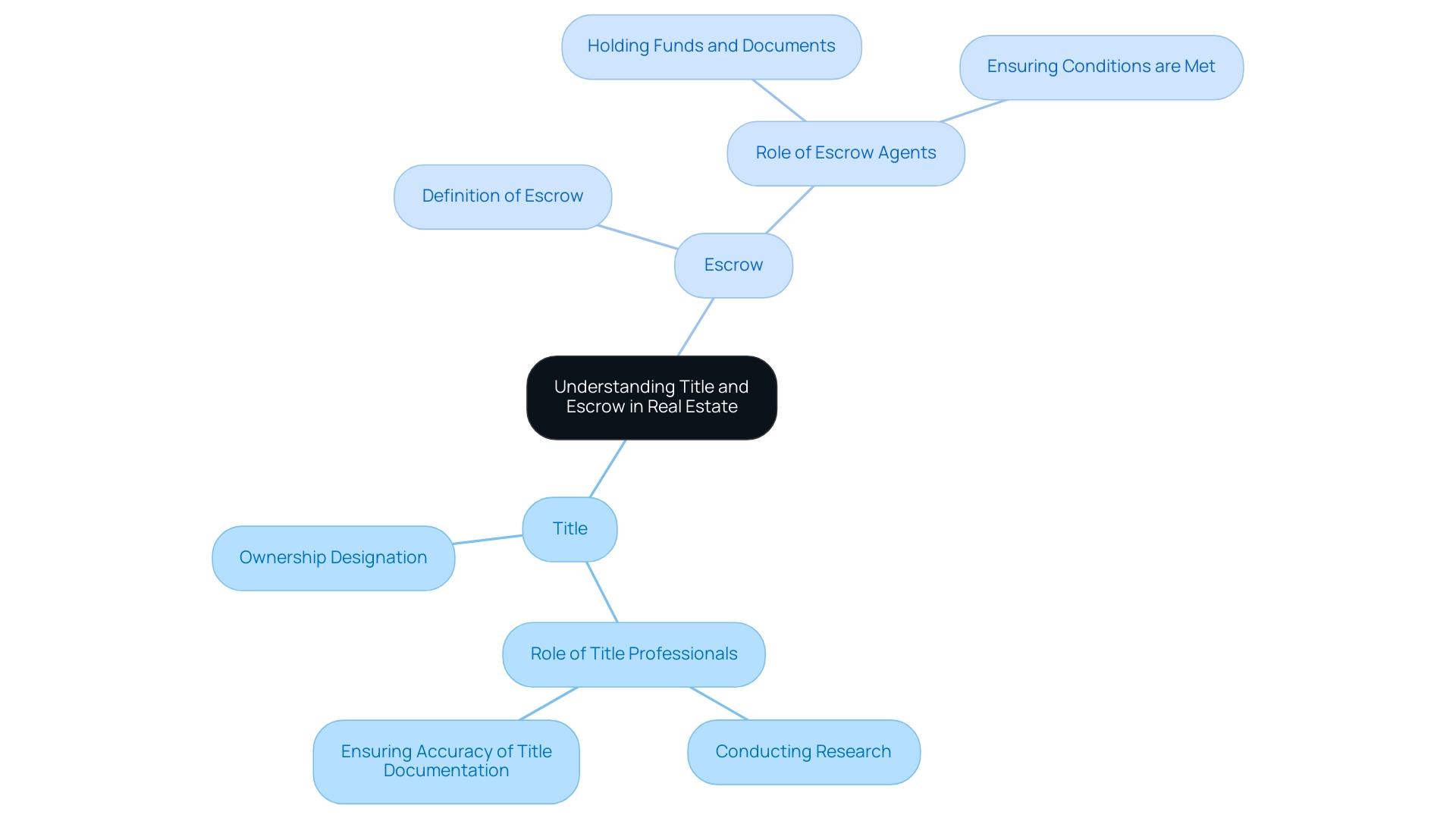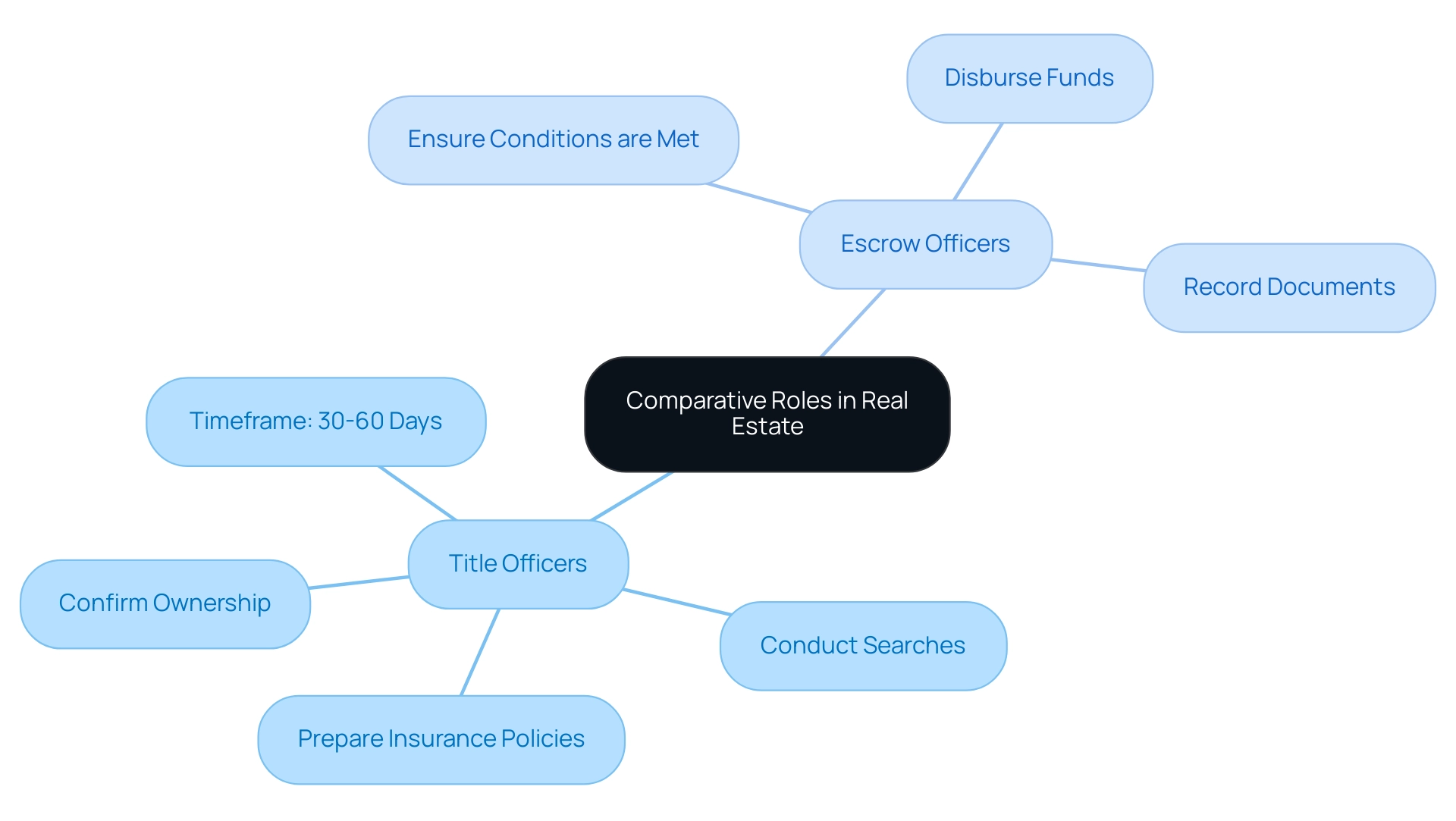Introduction
In the intricate world of real estate, understanding the roles of title and escrow officers is essential for ensuring smooth transactions. Title officers are tasked with verifying property ownership and conducting thorough research to safeguard against potential disputes, while escrow officers serve as neutral intermediaries, managing the flow of funds and documentation. As the industry evolves, these professionals face numerous challenges, from incomplete title records to the complexities of coordinating multiple parties.
However, the integration of advanced technology is transforming their workflows, enhancing efficiency and accuracy. This article delves into the fundamental concepts of title and escrow, compares the distinct responsibilities of these officers, examines the challenges they encounter, and highlights the significant impact of technology on their roles in the real estate landscape.
Understanding Title and Escrow in Real Estate
In real estate, the concepts of ownership and escrow are fundamental to the transaction process. A designation refers to the legal right of ownership of a property, which is confirmed through to ensure that the property is free of liens or claims.
- Title professionals are responsible for conducting this research and ensuring the accuracy of the title documentation.
Escrow, on the other hand, refers to a neutral third-party service that holds funds and documents until all conditions of the sale are met.
- Escrow agents oversee this process, ensuring that the transaction proceeds smoothly and that all parties fulfill their obligations.
Grasping these ideas is crucial as they establish the foundation for the particular functions that escrow agents perform in enabling real estate deals.

Comparative Roles of Title Officers and Escrow Officers
Title agents are mainly accountable for confirming and maintaining the integrity of ownership documents. They perform comprehensive searches to identify any potential issues that could affect ownership and prepare insurance policies to safeguard buyers and lenders against possible disputes. On average, title professionals take approximately 30 to 60 days to verify ownership, depending on the complexity of the property history.
In contrast, transaction coordinators act as intermediaries who handle the funds and paperwork involved in real estate dealings. Their duties include:
- Ensuring all conditions are met before the transfer of ownership
- Handling the disbursement of funds
- Recording documents with the appropriate authorities
Danielle Glock, a transaction specialist with Old Republic Title Company, highlights the significance of their role in ensuring a seamless process, stating,
It should be an amazing, fun experience to buy a house or to sell a house and start a new chapter.
A recent case study highlighted the legislative efforts in New York to reform insurance, which reflects the complexities and significance of these roles in the industry. While both roles are essential for finalizing a real estate deal, ownership specialists emphasize the legal aspects, whereas transaction agents focus on the procedural and financial components. This collaborative dynamic is essential for ensuring successful real estate transactions.
Moreover, recent advancements in the functions of property professionals include increased use of technology for property searches and the growing emphasis on transparency in the insurance process.

Challenges Faced by Title Officers and Escrow Officers
Both document specialists and escrow agents face diverse challenges that can greatly affect the efficiency of real estate transactions. Title professionals frequently deal with incomplete or inconsistent ownership records, which can postpone the verification of property ownership and the issuance of insurance. Parse Ai's advanced machine learning tools streamline this process by expediting processing and interpretation. By utilizing OCR technology, interactive labeling, and the example manager feature, title specialists can quickly annotate and extract vital information from unstructured materials, minimizing discrepancies in property ownership data and reducing the need for further investigation.
On the other hand, escrow officers may face difficulties coordinating among multiple parties, including buyers, sellers, and lenders. Miscommunication can lead to frustrating delays in closing transactions. Parse AI’s platform enhances collaboration by enabling full-text searches and efficient file management, ensuring that all stakeholders are on the same page. Additionally, with Harbinger Land's document imaging services, property data can be digitized efficiently, further supporting ownership research and leasing processes. Tackling these challenges demands a significant degree of teamwork and problem-solving abilities, along with the efficient application of technology such as Parse AI to enhance the research and transaction processes.

The Role of Technology in Enhancing Efficiency
Technology plays a pivotal role in enhancing the efficiency of property and escrow processes. For title professionals:
- Machine learning algorithms can analyze extensive datasets, swiftly recognizing ownership records and potential problems within title papers.
- Optical character recognition (OCR) technology enables the swift extraction of information from scanned files, decreasing the time taken for manual searches.
For transaction agents:
- Digital platforms enable smooth communication between parties, ensuring that all required documents and funds are monitored in real time.
These not only streamline workflows but also minimize the risk of errors, ultimately leading to faster and more accurate transactions. By leveraging these tools, title and escrow officers can better navigate the complexities of their roles, providing superior service to clients in the real estate industry.

Conclusion
The roles of title and escrow officers are indispensable in the real estate transaction process, serving distinct yet complementary functions. Title officers focus on verifying property ownership and ensuring the accuracy of title documentation, while escrow officers act as neutral intermediaries, managing the flow of funds and documents. Both professionals face significant challenges, from incomplete title records to the complexities of coordinating multiple parties, which can hinder transaction efficiency.
The integration of advanced technology is transforming these roles, enhancing both accuracy and efficiency. Title officers are now utilizing machine learning and OCR to expedite title searches and reduce discrepancies, while escrow officers benefit from digital platforms that facilitate real-time communication among all stakeholders. This technological evolution not only addresses existing challenges but also sets the stage for a more streamlined and effective transaction process.
In summary, understanding the intricate dynamics between title and escrow officers, along with the impact of technology, is crucial for anyone involved in real estate. As the industry continues to evolve, embracing these advancements will be essential for maintaining high standards of service and ensuring successful transactions. The future of real estate hinges on the seamless collaboration of these professionals and their ability to leverage technology to meet the demands of an increasingly complex market.
Discover how Parse AI can streamline your title research process—contact us today to learn more!
Frequently Asked Questions
What are the key concepts in real estate transactions?
The key concepts in real estate transactions are ownership and escrow. Ownership refers to the legal right to a property, confirmed through thorough research to ensure it is free of liens or claims. Escrow involves a neutral third-party service that holds funds and documents until all sale conditions are met.
What is the role of title professionals in real estate?
Title professionals are responsible for confirming property ownership and maintaining the integrity of ownership documents. They conduct comprehensive searches to identify potential issues affecting ownership and prepare insurance policies to protect buyers and lenders.
How long does it typically take for title professionals to verify ownership?
On average, title professionals take approximately 30 to 60 days to verify ownership, depending on the complexity of the property history.
What responsibilities do transaction coordinators have?
Transaction coordinators handle the funds and paperwork in real estate dealings, ensuring all conditions are met before ownership transfer, managing the disbursement of funds, and recording documents with the appropriate authorities.
How do the roles of ownership specialists and transaction agents differ?
Ownership specialists emphasize the legal aspects of property ownership, while transaction agents focus on the procedural and financial components of real estate transactions. Both roles are essential for finalizing deals.
What challenges do title professionals face in their work?
Title professionals often deal with incomplete or inconsistent ownership records, which can delay verification and insurance issuance. They utilize advanced machine learning tools to streamline the processing of ownership data.
What challenges do escrow agents encounter?
Escrow agents may face difficulties coordinating among multiple parties, leading to potential miscommunication and delays in closing transactions. Technology solutions can enhance collaboration and file management to mitigate these issues.
How is technology impacting the efficiency of property and escrow processes?
Technology enhances efficiency through machine learning algorithms that analyze ownership records, optical character recognition (OCR) for quick information extraction, and digital platforms that facilitate real-time communication and document management among parties involved in transactions.




